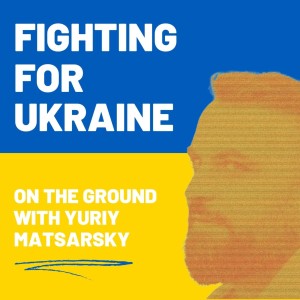
January 29th 2024
Yuriy reflects on the war and shares his experiences as one of the younger soldiers in a unit of parents and grandparents. Join us as he explores the sacrifices and determination of older generations in protecting the younger ones during wartime.
You can email Yuriy, ask him questions or simply send him a message of support: fightingtherussianbeast@gmail.com
You can help Yuriy and his family by donating to his GoFundMe: https://www.gofundme.com/f/help-yuriys-family
Yuriy’s Podbean Patron sign-up to give once or regularly: https://patron.podbean.com/yuriy
Buy Yuriy a coffee here: https://bmc.link/yuriymat
TRANSCRIPT: (Podbean app users can enjoy closed captions)
It is January 29.
Many years ago, before the war, I used to read fiction books. Then I switched to nonfiction and almost stopped reading anything fictional. Because here since 2014, from the beginning of Russian invasion, we have been so many tragedies, so much pain and despair that there was no point in sympathizing with book characters. How can one take fiction seriously? When thousands of real life King Lears are abandoned on the streets, scores of Odysseuses are left far away from where homes and countless Ophelias are driven mad by despair.
I stopped reading fiction a long time ago, but some of those books still live in my memory. For example, I vividly remember Kurt Vonnegut's book, 'Slaughterer House Five' or 'The Children's Crusade'. Vonnegut a US Army soldier during Second World War was captured by the Germans and sent to Dresden where he survived with the allied bombing of the city. He escaped death by hiding in one of a deep underground meat lockers an experience that inspired him to write the book about his war experiences. Hence the first part of the book title- Slaughterer House five.
The second part about the Children's Crusade is a quote from Vonnegut's wife. She described her husband and his comrades' participation in the war emphasizing where youthfulness when they went to the front. Most of them barely reached adulthood with they were in fact, children sent into real bloody war against the monstrous evil.
In our army too, there are very young girls and boys, but they are minority compared to the older soldiers. Men under 27 years old are not conscripted for war, those younger when that age come to the Army only as volunteers. However, even among the volunteers, the majority are people over thirty or even forty. At 43. I am one of the youngest in my unit, we have people aged 50 and even 55, and all of us volunteered.
We have been at war for over 700 days and no one knows how much longer it will last. In our free time conversations about what each person will do after the victory used to be common. However, these discussions now contain fewer concrete plans and more abstract dreams. People no longer talk about finding specific jobs or taking certain positions. They just express a desire to live, to see victory, and finally rest.
In ordinary life, I did not feel my age. There was no occasion to. But in the Army you immediately realize that you are not 20 anymore. Your back, legs and neck constantly remind you that they are not very happy with the burden of body armor, helmet, and heavy backpack. You can't run as fast as the young ones, you can't jump as high, and you have to stop more often for a break. But you still do your job. Hundreds of thousands of adults and even almost old people do everything for the sake of victory, despite bad knees, joint pain, high blood pressure, and other unpleasant things that come with age. It's a crusade, not of children, but of their parents and grandparents.
And I think that's how it should be. We must protect the younger generation, ensure their safe future. They should not die under shell and freeze in trenches or yearn far from home and familiar things. All of this is our responsibility now.
No comments yet. Be the first to say something!